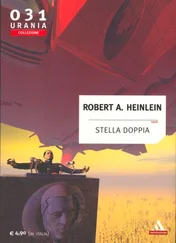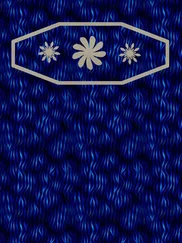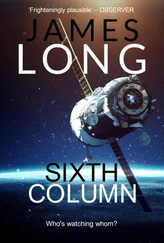Robert Heinlein - Sixth Column
Здесь есть возможность читать онлайн «Robert Heinlein - Sixth Column» весь текст электронной книги совершенно бесплатно (целиком полную версию без сокращений). В некоторых случаях можно слушать аудио, скачать через торрент в формате fb2 и присутствует краткое содержание. ISBN: , Жанр: Фантастика и фэнтези, на английском языке. Описание произведения, (предисловие) а так же отзывы посетителей доступны на портале библиотеки ЛибКат.
- Название:Sixth Column
- Автор:
- Жанр:
- Год:неизвестен
- ISBN:0-671-72026-0
- Рейтинг книги:3 / 5. Голосов: 1
-
Избранное:Добавить в избранное
- Отзывы:
-
Ваша оценка:
- 60
- 1
- 2
- 3
- 4
- 5
Sixth Column: краткое содержание, описание и аннотация
Предлагаем к чтению аннотацию, описание, краткое содержание или предисловие (зависит от того, что написал сам автор книги «Sixth Column»). Если вы не нашли необходимую информацию о книге — напишите в комментариях, мы постараемся отыскать её.
Sixth Column — читать онлайн бесплатно полную книгу (весь текст) целиком
Ниже представлен текст книги, разбитый по страницам. Система сохранения места последней прочитанной страницы, позволяет с удобством читать онлайн бесплатно книгу «Sixth Column», без необходимости каждый раз заново искать на чём Вы остановились. Поставьте закладку, и сможете в любой момент перейти на страницу, на которой закончили чтение.
Интервал:
Закладка:
"So it does," Calhoun agreed, "if we can learn to control it."
"Any doubt in your mind?"
"Well -- we don't know why it killed, and we don't know why it spared six of us, and we don't know why it doesn't harm animals."
"So -- Well, that seems to be the problem." He stared again at the simple-appearing enigma. "Doctor, I don't like to interfere with your work right from scratch, but I would rather you did not close that switch without notifying me in advance." His gaze dropped to Ledbetter's still figure and hurriedly shifted.
Over the coffee and sandwiches he pried further into the situation. "Then no one really knows what Ledbetter was up to?"
"You could put it that way," agreed Calhoun. "I helped him with the mathematical considerations, but he was a genius and somewhat impatient with lesser minds. If Einstein were alive, they might have talked as equals, but with the rest of us he discussed only the portions he wanted assistance on, or details he wished to turn over to assistants."
"Then you don't know what he was getting at?"
"Well, yes and no. Are you familiar with general field theory?"
"Criminy, no!"
"Well! -- that makes it rather hard to talk, Major Ardmore. Dr. Ledbetter was investigating the theoretically possible additional spectra --"
"Additional spectra?"
"Yes. You see, most of the progress in physics in the last century and a half has been in dealing with the electromagnetic spectrum, light, radio, X-ray --"
"Yes, yes, I know that, but how about these additional spectra?"
"That's what I am trying to tell you," answered Calhoun with a slight note of annoyance. "General field theory predicts the possibility of at least three more entire spectra. You see, there are three types of energy fields known to exist in space: electric, magnetic, and gravitic or gravitational. Light, X-rays, all such radiations, are part of the electromagnetic spectrum. Theory indicates the possibility of analogous spectra between magnetic and gravitic, between electric and gravitic, and finally, a three-phase type between electric-magnetio-gravitic fields. Each type would constitute a complete new spectrum, a total of three new fields of learning.
"If there are such, they would presumably have properties quite as remarkable as the electromagnetic spectrum and quite different. But we have no instruments with which to detect such spectra, nor do we even know that such spectra exist."
"You know," commented Ardmore, frowning a little, "I'm just a layman in these matters and don't wish to set my opinion up against yours, but this seems like a search for the little man who wasn't there. I had supposed that this laboratory was engaged in the single purpose of finding a military weapon to combat the vortex beams and A-bomb rockets of the PanAsians. I am a bit surprised to find the man whom you seem to regard as having been your ace researcher engaged in an attempt to discover things that he was not sure existed and whose properties were totally unknown. It doesn't seem reasonable. "
Calhoun did not answer; he simply looked supercilious and smiled irritatingly. Ardmore felt put in the wrong and was conscious of a warm flush spreading up toward his face. "Yes, yes," he said hastily, "I know I'm wrong -- whatever it was that Ledbetter found, it killed a couple of hundred men. Therefore it is a potential military weapon -- but wasn't he just mugging around in the dark?"
"Not entirely," Calhoun replied, with a words-of-one-syllable air. "The very theoretical considerations that predict additional spectra allow of some reasonable probability as to the general nature of their properties. I know that
Ledbetter had originally been engaged in a search for a means of setting up tractor and pressor beams -- that would be in the magneto-gravitic spectrum -- but the last couple of weeks he appeared to be in a condition of intense excitement and radically changed the direction of his experimentation. He was close-mouthed; I got no more than a few hints from the transformations and developments which he had me perform for him. However" -- Calhoun drew a bulky loose-leaf notebook from an inner pocket "he kept complete notes of his experiments. We should be able to follow his work and perhaps infer his hypotheses."
Young Wilkie, who was seated beside Calhoun, bent toward him. "Where did you find these, doctor?" he asked excitedly.
"On a bench in his laboratory. If you had looked you would have seen them."
Wilkie ignored the thrust; he was already eating up the symbols set down in the opened book. "But that is a radiation formula --"
"Of course it is -- d'you think I'm a fool?"
"But it's all wrong!"
"It may be from your standpoint; you may be sure that it was not to Dr. Ledbetter."
They branched off into argument that was totally meaningless to Ardmore; after some minutes he took advantage of a pause to say, "Gentlemen! Gentlemen! just a moment. I can see that I am simply keeping you from your work; I've learned all that I can just now. As I understand it, your immediate task is to catch up with Dr. Ledbetter and to discover what it is that his apparatus does -- without killing yourselves in the process. Is that right?"
"I would say that is a fair statement," Calhoun agreed cautiously.
"Very well, then -- carry on, and keep me advised at your convenience." He got up; the others followed his example. "Oh just one more thing."
"Yes?"
"I happened to think of something else. I don't know whether it is important or not, but it came to mind because of the importance that Dr. Brooks attached to the matter of the rats and mice." He ticked points off on his fingers.
"Many men were killed; Dr. Wilkie was knocked out and very nearly died; Dr. Calhoun experienced only a momentary discomfort; the rest of those who lived apparently didn't suffer any effects of any sort weren't aware that anything had happened except that their companions mysteriously died. Now, isn't that data of some sort?"
He awaited a reply anxiously, being subconsciously afraid that the scientists would consider his remarks silly, or obvious.
Calhoun started to reply, but Dr. Brooks cut in ahead of him. "Of course, it is! Now why didn't I think of that? Dear me, I must be confused today. That establishes a gradient, an ordered relationship in the effect of the unknown action." He stopped and thought, then went on almost at once. "I really must have your permission, Major, to examine the cadavers of our late colleagues, then by examining for differences between them and those alive, especially those hard hit by the unknown action --" He broke off short and eyed Wilkie speculatively.
"No, you don't!" protested Wilkie. "You won't make a guinea pig out of me. Not while I know it!" Ardmore was unable to tell whether the man's apprehension was real or facetious. He cut it short.
"The details will have to be up to you gentlemen. But remember -- no chances to your lives without notifying me."
"You hear that, Brooksie?" Wilkie persisted.
Ardmore went to bed that night from sheer sense of duty, not because he felt ready to sleep. His immediate job was accomplished; he had picked up the pieces of the organization known as the Citadel and had thrown it together into some sort of a going concern -- whether or not it was going any place he was too tired to judge, but at least it was going. He had given them a pattern to live by, and, by assuming leadership and responsibility, had enabled them to unload their basic worries on him and thereby acquire some measure of emotional security. That should keep them from going crazy in a world which had gone crazy.
What would it be like, this crazy new world -- a world in which the superiority of western culture was not a casually accepted 'Of course,' a world in which the Stars and Stripes did not fly, along with the pigeons, over every public building?
Читать дальшеИнтервал:
Закладка:
Похожие книги на «Sixth Column»
Представляем Вашему вниманию похожие книги на «Sixth Column» списком для выбора. Мы отобрали схожую по названию и смыслу литературу в надежде предоставить читателям больше вариантов отыскать новые, интересные, ещё непрочитанные произведения.
Обсуждение, отзывы о книге «Sixth Column» и просто собственные мнения читателей. Оставьте ваши комментарии, напишите, что Вы думаете о произведении, его смысле или главных героях. Укажите что конкретно понравилось, а что нет, и почему Вы так считаете.











